Module 3 Journey to space 现在完成时课件2021-2022学年八年级英语下册(共45张PPT)
文档属性
| 名称 | Module 3 Journey to space 现在完成时课件2021-2022学年八年级英语下册(共45张PPT) | 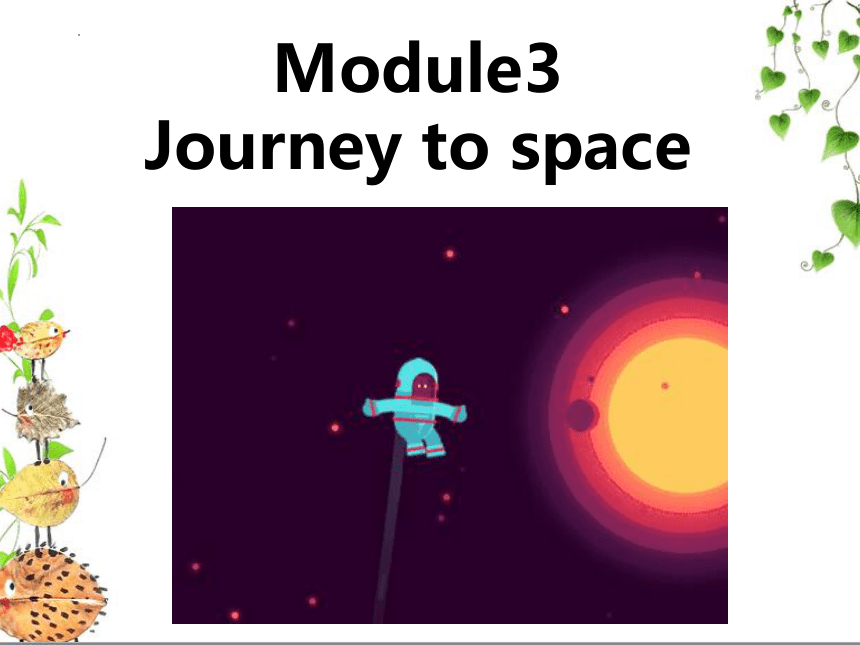 | |
| 格式 | pptx | ||
| 文件大小 | 1.1MB | ||
| 资源类型 | 教案 | ||
| 版本资源 | 外研版 | ||
| 科目 | 英语 | ||
| 更新时间 | 2022-02-28 13:20:54 | ||
图片预览

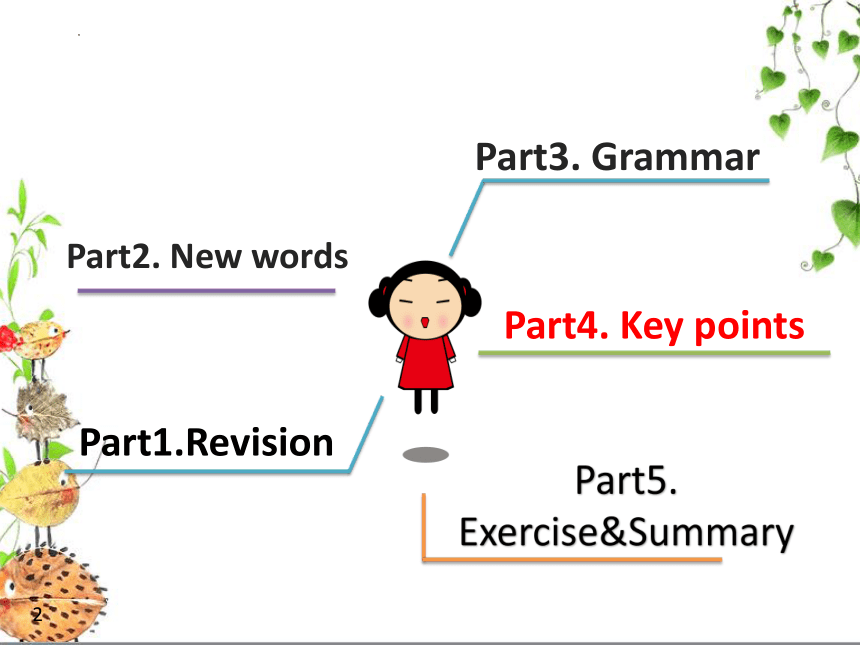
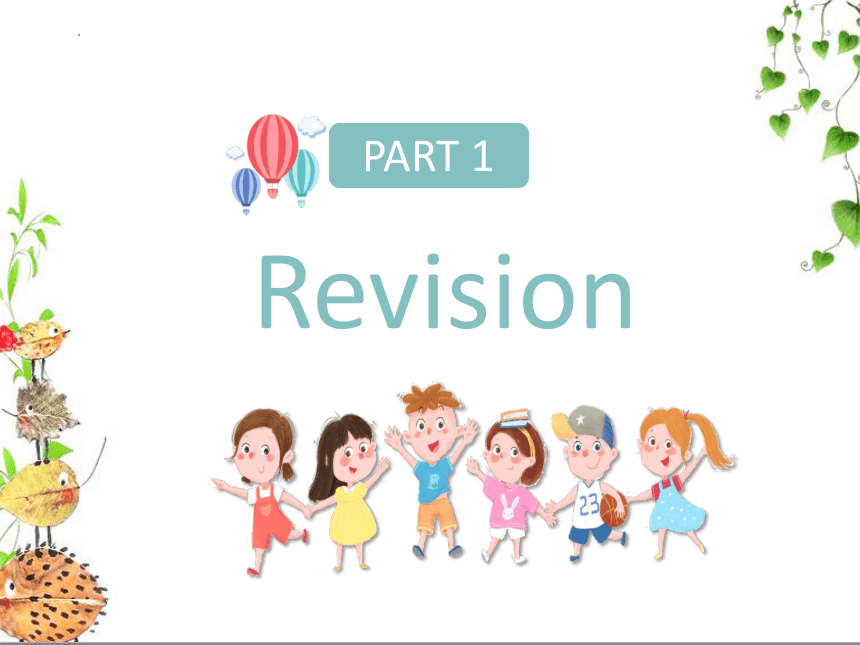
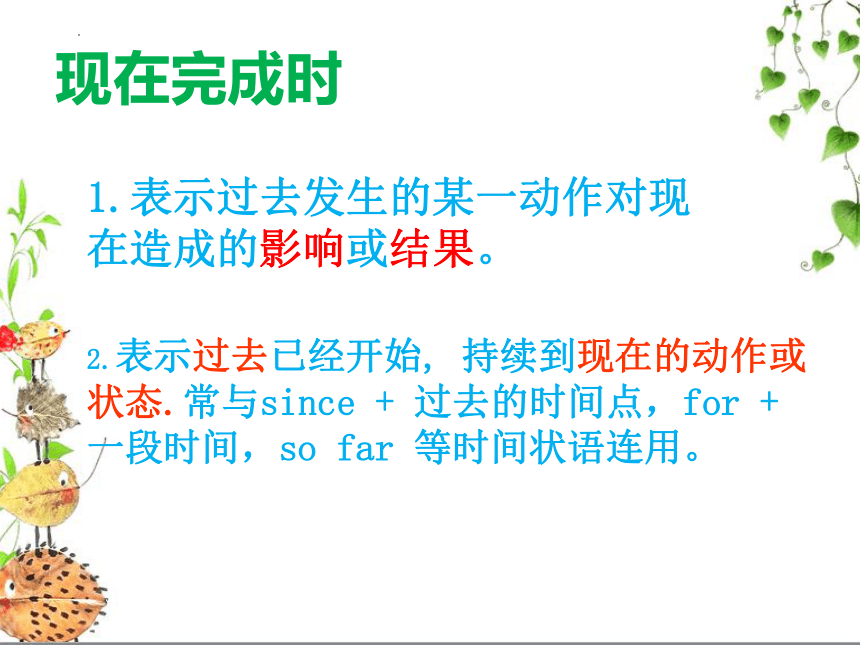
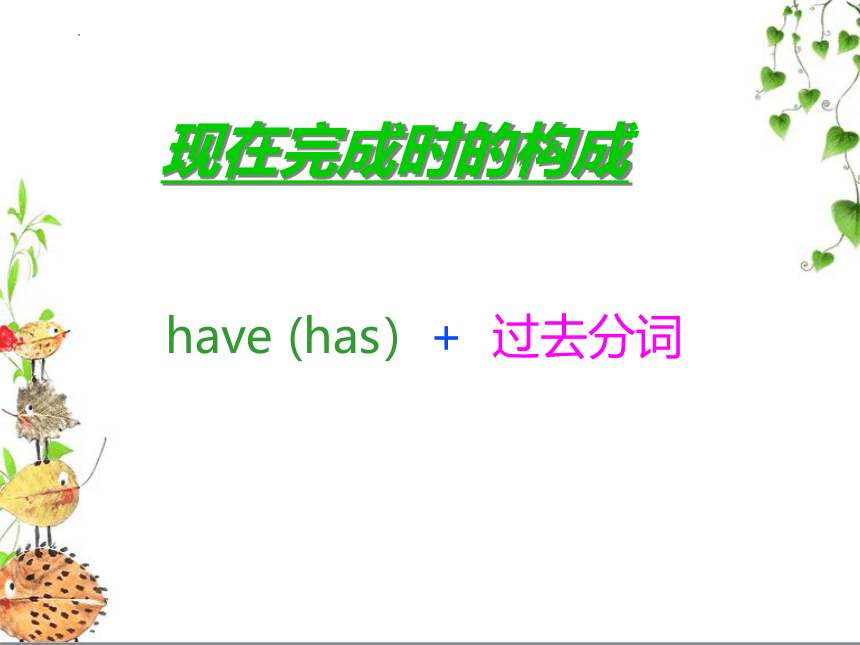
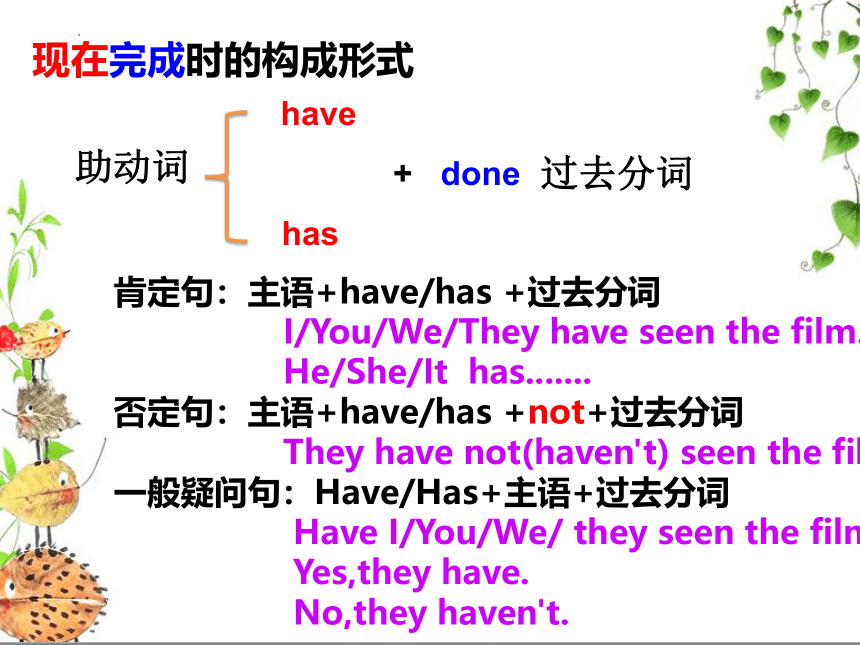
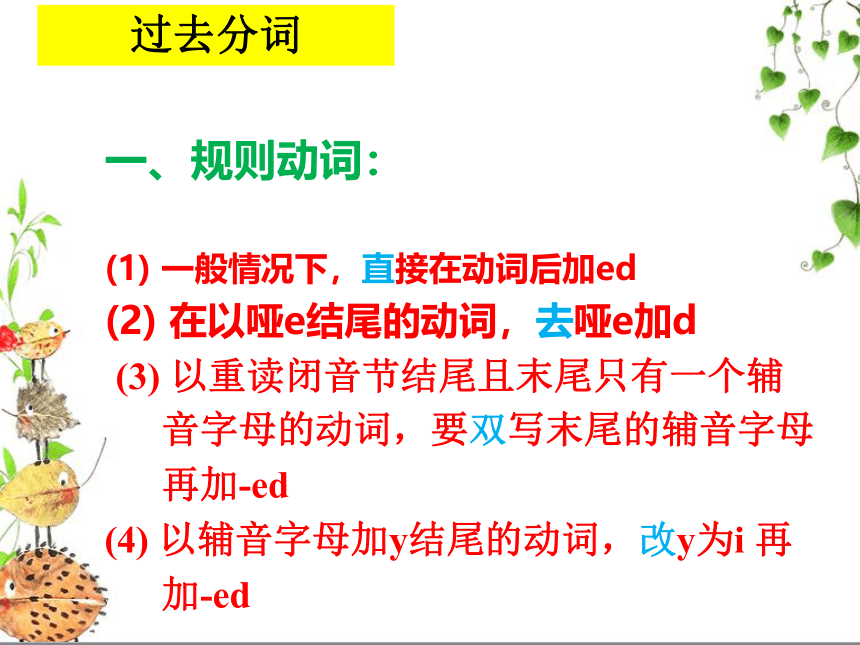
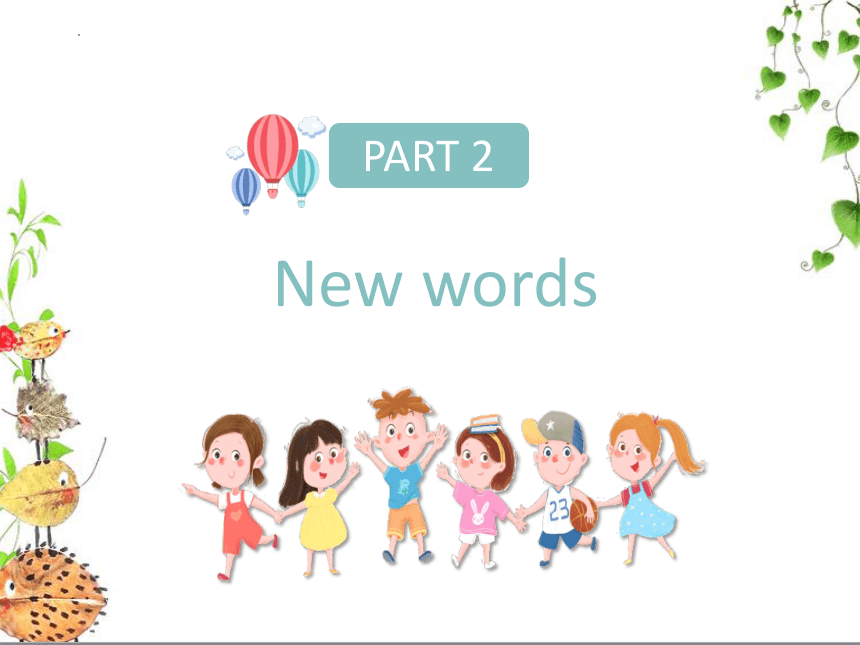
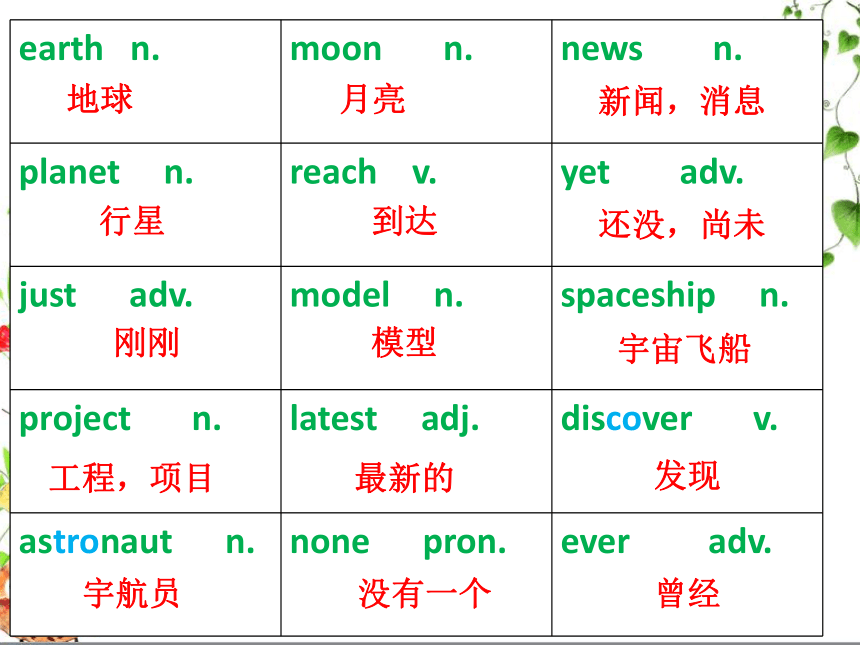
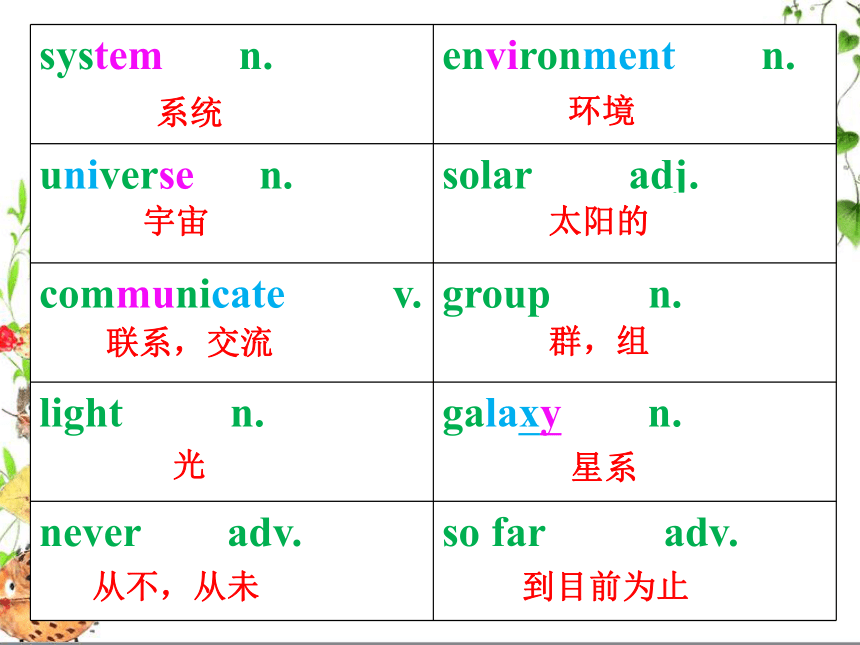


文档简介
(共45张PPT)
Module3
Journey to space
Part1.Revision
Part4. Key points
Part5. Exercise&Summary
Part3. Grammar
Part2. New words
2
Revision
PART 1
1.表示过去发生的某一动作对现在造成的影响或结果。
现在完成时
2.表示过去已经开始, 持续到现在的动作或状态.常与since + 过去的时间点,for + 一段时间,so far 等时间状语连用。
现在完成时的构成
have (has)+ 过去分词
现在完成时的构成形式
have
+ done
has
助动词
过去分词
肯定句:主语+have/has +过去分词
I/You/We/They have seen the film.
He/She/It has.......
否定句:主语+have/has +not+过去分词
They have not(haven't) seen the film.
一般疑问句:Have/Has+主语+过去分词
Have I/You/We/ they seen the film
Yes,they have.
No,they haven't.
过去分词
一、规则动词:
(1) 一般情况下,直接在动词后加ed
(2) 在以哑e结尾的动词,去哑e加d
(3) 以重读闭音节结尾且末尾只有一个辅
音字母的动词,要双写末尾的辅音字母
再加-ed
(4) 以辅音字母加y结尾的动词,改y为i 再
加-ed
New words
PART 2
earth n. moon n. news n.
planet n. reach v. yet adv.
just adv. model n. spaceship n.
project n. latest adj. discover v.
astronaut n. none pron. ever adv.
地球
月亮
新闻,消息
行星
到达
还没,尚未
刚刚
模型
宇宙飞船
工程,项目
最新的
发现
宇航员
没有一个
曾经
system n. environment n.
universe n. solar adj.
communicate v. group n.
light n. galaxy n.
never adv. so far adv.
系统
环境
宇宙
太阳的
联系,交流
群,组
光
星系
从不,从未
到目前为止
Enjoy the dialogue
PART 1
What are you up to
I’ve just made a model spaceship for our school project.
I haven’t started yet.
So have they discovered life on Mars
Have you heard the latest news
Scientists have sent spaceship to Mars.
No,they haven’t yet.
Are there any astronauts in the spaceship
No,there aren’t.
Why not
Because Mars is very far away.
Grammar
PART 3
现在完成时的时间状语
◆常与不确定的时间状语连用,如:already, never, ever, just, yet, before, so far, in the past few years等,表示“到目前为止”所发生的动作.
◆还可以和表示一段时间的状语连用, since, for a long time等.
already 往往用于肯定句,
用在疑问句时表示强 调或加强语气;
yet 用于否定句和疑问句。
He has already left here.
Has he already left here
他(真的)已经离开这里了吗?(表示加强语气)
My teachers haven’t had breakfast yet.
我的老师们还没有吃早饭。
Have you written to your parents yet
你已经给你父母写过信了吗?
never 是否定词,表示“从来没有”
ever 表示“曾经”
We have never been to the Great Wall.
我们从来没有去过长城。
Have you ever been to Canada
你们曾经去过加拿大吗?
just表示“刚刚”
(多用在助动词have/has和动词过去分词之间)
He has just come back.
They have just finished the work.
before 用于完成时
ago 用于过去时
He has started his work ten years before.
他十年前就已经开始他的工作了。
He started his work ten years ago.
他是十年前开始他的工作的。
现在完成时的运用
2.现在完成时常和 for 或 since 引导的表示 “一段时间”的短语或从句连用,此时动词不可用瞬间动词,而必须用延续性动词。
since
Mr. Li has worked here since 2010.
(自2020年以来,李先生一直在这工作。)
I have known him since 7 years ago.
(自从7年前我就认识他。)
He’s learned about 500 words since he went to college.
(他上大学以来大约学了五千个英语单词)
上一页
一个时间点
一段时间+ago
从句
for+一段时间
(two weeks/six months/five days)
表示动作延续多长时间 。
He has taught in this school for four years.
(我们认识有二十年了。)
I haven’t seen her for a long time.
(我好久没有见到她了。)
用for 或since填空
Mr. Brown has had his TV ______ 15 years.
I’ve taken driving lessons _______last month.
My sister has had her cell phone ______a month .
My friends haven’t visited me ______my birthday.
We haven’t used our car _____ a long time .
She hasn’t had a good cup of coffee _____years.
Tom has worn glasses _______he was 7 years old.
for
since
for
since
for
for
since
He bought a car six months ago. 他六个月前买了一辆车。
(与过去具体时间连用,表示过去的动作)
He has already bought a car. 他已经买了一辆车。
(说明现在他有车的事实)
He has had a car for six months. 他买车已经半年了。
瞬间动词
延续性动词
I borrowed a book last week. 上周我借了一本书。
(说明过去的动作,与过去具体时间连用)
I have borrowed the book. 我已经借了那本书了。
(说明现在书在我这里的事实)
I have kept the book for a week.
我已经借那本书一周了。
(与for a week即 “一段时间”连用,用持续性动词keep替换瞬间性动词borrow。)
瞬间动词变延续性动词
动作
状态
die
be over
leave
borrow/buy
arrive
begin/ start
end/finish/stop
join
marry
keep/had
be away
be here
be on(上演)
be married
be in/a member of
be dead
come/go
be in/at
辨析 have been to和 have gone to
She has been to China .
她(曾经)去过中国。(去过)
have been to someplace. 曾经去过某地,已经回来.
has gone to someplace.某人去了某地,还没有回来.
She has gone to China last week.
上周她去了上海 。(去了)
She has been in China for 5 years.
她已经待在中国五年了。(待着)
用have/has been to, have/has gone to填空:
1.—Where is your brother
—He ____________ the shop. He’ll be back soon.
2. — ______ you ever _________ America
—Yes, I ___________ New York twice.
3. —Here you are at last! Where _____ you _____
—I _____________ London.
4. —David _____________Australia.
—I’m sure he’s already arrived.
5. —Is Benny here
—No, he __________ the school library. He left
five minutes ago.
has gone to
Have been to
have been to
have been
have been to
has gone to
has gone to
( )1. I have finished my homework ____.
Have you finished your homework
____
A. yet, yet
B. yet, already
C. already, yet
D. already, already
Exercises
( )2. I haven’t seen Kate ____ 4 months.
A. already B. since
C. for D. yet
( )3. He has ____ seen the film Harry
Potter. So he knows nothing about it.
A. already B. ever
C. never D. yet
Exercises
( ) 4. She has been ill in bed ____ two days ago.
A. since B. in
C. during D. for
( )5. I have ____ watched a wonderful film. It’s really interesting.
A. yet B. just C. just now D. never
Exercises
( )6. — Oh, Mrs King, your dress looks
very nice. Is it new
— No, I ___ it since two years ago.
A. had
B. bought
C. have had
D. have bought
( )7. — ___you __a ticket for the football
match
— Not yet.
A. Is, bought
B. Are, bought
C. Has, bought
D. Have, bought
Key points
PART 4
in order to +动原
为了做某事,表目的,位于句首或句中
He got up early in order to catch the first bus.
= In order to catch the first bus, he got up early.
in order that +句子
E.g. I work very hard in order that I can pass the exam.
2. so…that… & such…that…
so+形容词或副词+that ...
E g. The stone is so heavy that I can’t move it.
such +(a/an)+adj.+可数n.(单/复)/不可数n.+that…
E.g. He is such a clever boy that everybody likes him.
E.g. They are such interesting novels that I want to read
them once again.
E.g. He has made such great progress that the teachers are
pleased with him.
He is _____ a clever boy ______every teacher likes
him very much.
2. The song is ______popular _______most people can sing it.
3. There is ______much milk in the fridge ______you don’t need to buy it.
such that
so that
so
that
so…that…/ such…that
too many +可数名词,表示“太多”
E.g. There are too many people in the park.
too much +不可数名词,表示“太多”
E.g. I have too much homework to do.
much too +形容词或副词,表示“太……;非常……”
E.g. It is much too cold.
too many, too much 与much too
alone 作形容词时,表示“孤单的”
E.g. He was alone again.alone
作副词时,表示“独自”
E.g. I don't like going out alone after dark.
alone & lonely
lonely 表示“孤独的,寂寞的”。
E.g.He lives alone,but he doesn't feel lonely.
finish +doing sth. 表示“做完某事”。
E.g. I finished practicing the piano just now.
enjoy +doing sth. 表示“热衷于做某事”。
E.g. He enjoys reading.
小结:除finish ,enjoy 外,like, love, look forward to, give up, practice, miss, avoid(避免),risk,
forbid(禁止)等词后要加ing形式。
Exercises
PART 5
( )1. My bike is broken down. That’s ______ I was late.
A. because B. for C.what D. why
( )2. They were all very tired, but ____ of them had a rest.
A. none B. all C.both D. either
( )3. Mrs Black lives _____ and she often feels _______.
A.lonely;alone B. alone;lonely
C.alone;alone D. lonely;lonely
Summary
PART 6
See you !
Module3
Journey to space
Part1.Revision
Part4. Key points
Part5. Exercise&Summary
Part3. Grammar
Part2. New words
2
Revision
PART 1
1.表示过去发生的某一动作对现在造成的影响或结果。
现在完成时
2.表示过去已经开始, 持续到现在的动作或状态.常与since + 过去的时间点,for + 一段时间,so far 等时间状语连用。
现在完成时的构成
have (has)+ 过去分词
现在完成时的构成形式
have
+ done
has
助动词
过去分词
肯定句:主语+have/has +过去分词
I/You/We/They have seen the film.
He/She/It has.......
否定句:主语+have/has +not+过去分词
They have not(haven't) seen the film.
一般疑问句:Have/Has+主语+过去分词
Have I/You/We/ they seen the film
Yes,they have.
No,they haven't.
过去分词
一、规则动词:
(1) 一般情况下,直接在动词后加ed
(2) 在以哑e结尾的动词,去哑e加d
(3) 以重读闭音节结尾且末尾只有一个辅
音字母的动词,要双写末尾的辅音字母
再加-ed
(4) 以辅音字母加y结尾的动词,改y为i 再
加-ed
New words
PART 2
earth n. moon n. news n.
planet n. reach v. yet adv.
just adv. model n. spaceship n.
project n. latest adj. discover v.
astronaut n. none pron. ever adv.
地球
月亮
新闻,消息
行星
到达
还没,尚未
刚刚
模型
宇宙飞船
工程,项目
最新的
发现
宇航员
没有一个
曾经
system n. environment n.
universe n. solar adj.
communicate v. group n.
light n. galaxy n.
never adv. so far adv.
系统
环境
宇宙
太阳的
联系,交流
群,组
光
星系
从不,从未
到目前为止
Enjoy the dialogue
PART 1
What are you up to
I’ve just made a model spaceship for our school project.
I haven’t started yet.
So have they discovered life on Mars
Have you heard the latest news
Scientists have sent spaceship to Mars.
No,they haven’t yet.
Are there any astronauts in the spaceship
No,there aren’t.
Why not
Because Mars is very far away.
Grammar
PART 3
现在完成时的时间状语
◆常与不确定的时间状语连用,如:already, never, ever, just, yet, before, so far, in the past few years等,表示“到目前为止”所发生的动作.
◆还可以和表示一段时间的状语连用, since, for a long time等.
already 往往用于肯定句,
用在疑问句时表示强 调或加强语气;
yet 用于否定句和疑问句。
He has already left here.
Has he already left here
他(真的)已经离开这里了吗?(表示加强语气)
My teachers haven’t had breakfast yet.
我的老师们还没有吃早饭。
Have you written to your parents yet
你已经给你父母写过信了吗?
never 是否定词,表示“从来没有”
ever 表示“曾经”
We have never been to the Great Wall.
我们从来没有去过长城。
Have you ever been to Canada
你们曾经去过加拿大吗?
just表示“刚刚”
(多用在助动词have/has和动词过去分词之间)
He has just come back.
They have just finished the work.
before 用于完成时
ago 用于过去时
He has started his work ten years before.
他十年前就已经开始他的工作了。
He started his work ten years ago.
他是十年前开始他的工作的。
现在完成时的运用
2.现在完成时常和 for 或 since 引导的表示 “一段时间”的短语或从句连用,此时动词不可用瞬间动词,而必须用延续性动词。
since
Mr. Li has worked here since 2010.
(自2020年以来,李先生一直在这工作。)
I have known him since 7 years ago.
(自从7年前我就认识他。)
He’s learned about 500 words since he went to college.
(他上大学以来大约学了五千个英语单词)
上一页
一个时间点
一段时间+ago
从句
for+一段时间
(two weeks/six months/five days)
表示动作延续多长时间 。
He has taught in this school for four years.
(我们认识有二十年了。)
I haven’t seen her for a long time.
(我好久没有见到她了。)
用for 或since填空
Mr. Brown has had his TV ______ 15 years.
I’ve taken driving lessons _______last month.
My sister has had her cell phone ______a month .
My friends haven’t visited me ______my birthday.
We haven’t used our car _____ a long time .
She hasn’t had a good cup of coffee _____years.
Tom has worn glasses _______he was 7 years old.
for
since
for
since
for
for
since
He bought a car six months ago. 他六个月前买了一辆车。
(与过去具体时间连用,表示过去的动作)
He has already bought a car. 他已经买了一辆车。
(说明现在他有车的事实)
He has had a car for six months. 他买车已经半年了。
瞬间动词
延续性动词
I borrowed a book last week. 上周我借了一本书。
(说明过去的动作,与过去具体时间连用)
I have borrowed the book. 我已经借了那本书了。
(说明现在书在我这里的事实)
I have kept the book for a week.
我已经借那本书一周了。
(与for a week即 “一段时间”连用,用持续性动词keep替换瞬间性动词borrow。)
瞬间动词变延续性动词
动作
状态
die
be over
leave
borrow/buy
arrive
begin/ start
end/finish/stop
join
marry
keep/had
be away
be here
be on(上演)
be married
be in/a member of
be dead
come/go
be in/at
辨析 have been to和 have gone to
She has been to China .
她(曾经)去过中国。(去过)
have been to someplace. 曾经去过某地,已经回来.
has gone to someplace.某人去了某地,还没有回来.
She has gone to China last week.
上周她去了上海 。(去了)
She has been in China for 5 years.
她已经待在中国五年了。(待着)
用have/has been to, have/has gone to填空:
1.—Where is your brother
—He ____________ the shop. He’ll be back soon.
2. — ______ you ever _________ America
—Yes, I ___________ New York twice.
3. —Here you are at last! Where _____ you _____
—I _____________ London.
4. —David _____________Australia.
—I’m sure he’s already arrived.
5. —Is Benny here
—No, he __________ the school library. He left
five minutes ago.
has gone to
Have been to
have been to
have been
have been to
has gone to
has gone to
( )1. I have finished my homework ____.
Have you finished your homework
____
A. yet, yet
B. yet, already
C. already, yet
D. already, already
Exercises
( )2. I haven’t seen Kate ____ 4 months.
A. already B. since
C. for D. yet
( )3. He has ____ seen the film Harry
Potter. So he knows nothing about it.
A. already B. ever
C. never D. yet
Exercises
( ) 4. She has been ill in bed ____ two days ago.
A. since B. in
C. during D. for
( )5. I have ____ watched a wonderful film. It’s really interesting.
A. yet B. just C. just now D. never
Exercises
( )6. — Oh, Mrs King, your dress looks
very nice. Is it new
— No, I ___ it since two years ago.
A. had
B. bought
C. have had
D. have bought
( )7. — ___you __a ticket for the football
match
— Not yet.
A. Is, bought
B. Are, bought
C. Has, bought
D. Have, bought
Key points
PART 4
in order to +动原
为了做某事,表目的,位于句首或句中
He got up early in order to catch the first bus.
= In order to catch the first bus, he got up early.
in order that +句子
E.g. I work very hard in order that I can pass the exam.
2. so…that… & such…that…
so+形容词或副词+that ...
E g. The stone is so heavy that I can’t move it.
such +(a/an)+adj.+可数n.(单/复)/不可数n.+that…
E.g. He is such a clever boy that everybody likes him.
E.g. They are such interesting novels that I want to read
them once again.
E.g. He has made such great progress that the teachers are
pleased with him.
He is _____ a clever boy ______every teacher likes
him very much.
2. The song is ______popular _______most people can sing it.
3. There is ______much milk in the fridge ______you don’t need to buy it.
such that
so that
so
that
so…that…/ such…that
too many +可数名词,表示“太多”
E.g. There are too many people in the park.
too much +不可数名词,表示“太多”
E.g. I have too much homework to do.
much too +形容词或副词,表示“太……;非常……”
E.g. It is much too cold.
too many, too much 与much too
alone 作形容词时,表示“孤单的”
E.g. He was alone again.alone
作副词时,表示“独自”
E.g. I don't like going out alone after dark.
alone & lonely
lonely 表示“孤独的,寂寞的”。
E.g.He lives alone,but he doesn't feel lonely.
finish +doing sth. 表示“做完某事”。
E.g. I finished practicing the piano just now.
enjoy +doing sth. 表示“热衷于做某事”。
E.g. He enjoys reading.
小结:除finish ,enjoy 外,like, love, look forward to, give up, practice, miss, avoid(避免),risk,
forbid(禁止)等词后要加ing形式。
Exercises
PART 5
( )1. My bike is broken down. That’s ______ I was late.
A. because B. for C.what D. why
( )2. They were all very tired, but ____ of them had a rest.
A. none B. all C.both D. either
( )3. Mrs Black lives _____ and she often feels _______.
A.lonely;alone B. alone;lonely
C.alone;alone D. lonely;lonely
Summary
PART 6
See you !
同课章节目录
- Module 1 Feelings and impressions
- Unit 1 It smells delicious.
- Unit 2 I feel nervous when I speak Chinese .
- Unit 3 Language in use
- Module 2 Experiences
- Unit 1 I've also entered lots of speaking competi
- Unit 2 They have seen the Pyramids.
- Unit 3 Language in use
- Module 3 Journey to space
- Unit 1 Has it arrived yet?
- Unit 2 We have not found life on any other planet
- Unit 3 Language in use
- Module 4 Seeing the docto
- Unit 1 I haven't done much exercise since I got m
- Unit 2 We have played football for a year now
- Unit 3 Language in use
- Module 5 Cartoons
- Unit 1 It's time to watch a cartoon.
- Unit 2 Tintin has been popular for over eighty yea
- Unit 3 Language in use
- Revision module A
- Module 6 Hobbies
- Unit 1 Do you collect anything ?
- Unit 2 Hobbies can make you grow as a person.
- Unit 3 Language in use
- Module 7 Summer in Los Angeles
- Unit 1 Please write to me and send me some photos
- Unit 2 Fill out a form and come to learn English
- Unit 3 Language in use
- Module 8 Time off
- Unit 1 I can hardly believe we are in the city ce
- Unit 2 We thought somebody was moving about
- Unit 3 Language in use
- Module 9 Friendship
- Unit 1 Could I ask if you've mentioned this to he
- Unit 2 I believe that the world is what you think
- Unit 3 Language in use
- Module 10 On the radio
- Unit 1 I hope that you can join us one day
- Unit 2 It seemed that they were speaking to me in
- Unit 3 Language in use
- Revision module B
